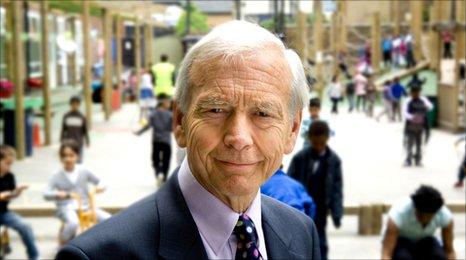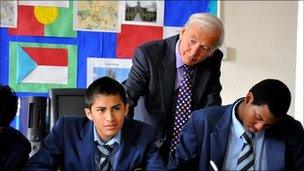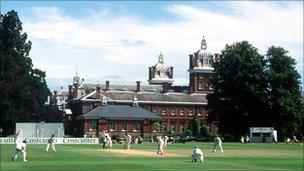What's wrong with our schools?
- Published

John Humphrys goes back to school for BBC Two's School Season
John Humphrys investigates what can be done to close the widening gap between the educational achievements of advantaged and disadvantaged pupils in England for his BBC TV documentary, Unequal Opportunities.
I have spent the best part of the last year going back to school. Lots of schools.
Sweet little primaries and pre-schools where sandpits win out over computers. Crumbling concrete comprehensives with tough guards at the gates and slouching teenagers inside who would prefer not to be.
Spanking new academies where the head has a knighthood and you are in trouble if your tie is askew. One of our great public schools where privilege oozes from the ancient stones and £25,000 a year barely covers the cost.
I have wandered the corridors of them all and sat in classes and talked to the children and their parents. I have interviewed teachers and head teachers and academics and think-tankers trying to answer the question: what is going wrong?
Given that education is meant to be the key that unlocks the barrier to social mobility and we have spent a fortune on our schools over the last couple of decades, why is the social gap no longer narrowing?
Or, to put it in nice simple language, why do rich, thick kids do better than poor, clever children?
If you take exception to either the language or the sentiment, do not blame me. I am quoting the Education Secretary, Michael Gove, who also said that other countries are moving ahead faster than we are and it is getting worse.
Whether his policies are likely to be any more effective than the last government's is something we will come to later, but it is hard to fault his conclusion.
Rich kids - thick or otherwise - do better than poor. The biggest predictor by far of how well a child will do in later life is the parents' income.
That may be unsurprising but it is nonetheless deeply shocking. Indeed, you might argue that it is shocking because it is unsurprising. We have always known it, but we have still allowed it to happen. We expect it.
Yet it is not as though it is somehow pre-ordained - the inevitable result of wealth divisions that exist everywhere. The comparison with other countries proves that it is not.
Widening gap
Stoke-on-Trent is one of the UK's most deprived areas. In 2004, they tested a cohort of three-year-old children and found that 64% of them were a year behind the national average. A year is an awfully long time at three.
So the authorities embarked on a huge - and very expensive - campaign. They gave free nursery provision to parents and trained every public sector worker who came into contact with small children in how to improve their language.
Not just the obvious people such as nursery staff, but firemen and police officers and anyone else who might go into people's homes.
It worked - up to a point.
They reduced the 64% by more than 10%. But one of the speech therapists involved in setting up the scheme told me it would take a generation to achieve the national average. And that assumes they can afford to keep it going.
So what happens when the disadvantaged children go to school?
By the time they are 14, they are two years behind their more privileged peers and by the time they hit 16, they are massively less likely to go on to higher education, let alone the best universities.
In other words, the gap widens during the school years, rather than narrows.

John Humphrys met students at state schools, flagship academies and independent private schools
Aim Higher programme
I moved north from Stoke to Kirkby in Lancashire.
The planners who "designed" Kirkby in the 50s obviously thought it was a brilliant idea to take people from the terrace houses and close communities of Liverpool and dump them into concrete tower blocks a few miles outside the city with almost none of the little extras that make life liveable - like shops.
It was a disaster then and it still has massive problems half a century later.
Four in every 10 children live in homes where no-one earns a penny. A third of children live in one-parent households. Last year children from this education authority did worse at A-levels than any other children in England.
So they built new schools.
The one I visited - All Saints - does not call itself a school and they do not like the children doing so either. It is a "learning centre", if you please.
But let's forgive it that absurdity because it was here I met Robyn, a skinny 16-year-old with a sharp brain and the certain knowledge that one day, she will be a lawyer, maybe a judge.
A couple of years ago, she expected to escape from school at the earliest possible opportunity and probably go on the dole - just like so many of her friends.
Robyn was rescued - I can't think of a better word - by the "Aim Higher" programme, which employs so-called mentors to look out for children like her, show them what they are capable of and help them get there.
As with the programme in Stoke, this worked too. Up to a point.
I talked to Robyn and her mentor and a handful of other youngsters who had been signed up to it in the superb school library - bright and airy, full of new books and new computers. I have seen the future, I thought, and it works.
What I did not see and did not know about until later were the guards who had been posted at the library entrance to stop a gang of kids crashing in and causing mayhem.
So let's qualify what I have just said. It works for the chosen few. It leaves the many behind.
Robyn knows what she would do with the education system. She would shut down the private schools. All of them.
"I would make them go to state schools so everyone has a fair and equal chance," she told me.
Ah, the naive idealism of youth. Or maybe not.
The Sutton Trust, a respected education charity, agrees with Robyn's analysis, if not with her recommendation. Their own research shows there is no other advanced country where the gap in performance between the state and private sectors is so large.
'Real world'

Founded in 1859, Wellington College was set up as the national monument to Lord Wellington
It is a couple of hundred miles on the motorway from All Saints in Kirkby to Wellington College in Berkshire and approximately one hundred light years.
This is about as grand as it gets - 400 acres of rolling countryside, a magnificent mansion and some world class teachers - all of it under the control of Anthony Seldon, writer, thinker, biographer of Tony Blair, chronicler of the New Labour years and the Master of Wellington.
Yes of course you could get rid of every independent school, he told me, but you would end up with new inequalities simply because there will always be elites.
I said I would prefer to have elites who had got to the top because they were clever or talented or hard-working rather than because they were born to rich parents and he gave me one of those looks that says, "Wouldn't we all, but let's try living in the real world."
And in this real world? "Freedom," he said. That is the answer.
"Isn't it ironic that Britain has become more socially divided over the past 25 years when we have been putting more money into our state schools?
"What needs to happen is that state schools need to be freed up and become more like independent schools where heads can run them in the way they want to run them."
I point out that the first thing they might want is the sort of budget Professor Seldon has at his disposal, but we are in the real world, right?
'Surrogate parent'
So I went to many more state schools and asked their heads what they wanted and they all told me exactly the same thing. They want freedom. All of them.
Yes of course they would like more money too, but mostly what they wanted was the ability to run the school the way they chose to run it.
If you couple that freedom with a bit more cash and the best head teacher money can buy, then you end up with something like Mossbourne Academy, proud flagship of the academy movement.
This is where Labour ministers loved to come to show what could be done.
It is in one of the most deprived areas of London and the school that used to stand here was so bad they knocked it down, spent a fortune building a new one and a smaller fortune hiring a new head teacher.
That head teacher is Sir Michael Wilshaw and if the exam results are anything to go by, he is worth every penny of his salary.
Discipline is rigid. I sat in the canteen eating lunch with one of the teachers, watching the pupils (sorry, students, they are all students now) lining up in orderly fashion for their meals.
She swivelled away from me at one point and directed a look at one of the boys. She might as well have jabbed him with a cattle prod.
He glanced down immediately and tucked a bit of shirt tail back into his trousers. No words were spoken - no need for them.

Mossbourne, one of the first academies was opened by Tony Blair in 2005.
Sir Michael says children who come from "unstructured" backgrounds need structure. It liberates them from the chaos of what goes on in their daily lives.
Talk off camera to heads of competing schools in the area and they will mutter about Mossbourne succeeding partly at their expense - saying it is creaming off the brightest children from the surrounding area and is effectively a selective school.
Sir Michael says that is not true. But he is happy to agree that the extra cash that came with academy status means he can do things he would not otherwise be able to do.
Many of the children come to school at seven in the morning and leave at six at night. Some even come on Saturday mornings. And when they go home, a teacher walks with them, escorting them past the temptation zone at the edge of their estate where they might go astray.
I suggest the school is assuming the role of parent. Sir Michael does not take issue. Better the school become the surrogate parent than no parenting at all, he says. He wants to get a lot of children from areas like this to spend much more time in school.
As for the new building, it might look like IKEA from the outside, but it is brilliant inside. But let's not assume new buildings make good schools.
I am basing this on observation rather than statistics because you cannot do it with statistics, but neither parents nor teachers seem to give priority to the fabric of the school. It is the teaching that matters.
I went to two schools in Huddersfield right next door to each other - one of them old and shabby and the other brand new and superbly equipped. Money didn't seem to be an issue.
The new bicycle hanging suspended from one wall in the splendid atrium is a form of bribe to children who might play truant. They can win a new bike if their attendance record is good enough.
Yet parents fight to get their children into the old school. Sometimes it's because they went there themselves but often it is because they have looked at the exam results and like the approach the head teacher takes.
But it is this school that the local authority wants to close down.
Special measures
I visited one west London school that I had been to more than 15 years ago - a rough school in a rough area.
It was in special measures then, which is a bureaucratic way of saying you would cut your right arm off rather than let your child go there. Riots were commonplace.
When a former head girl went back for speech day a few years ago, she told the audience her lasting memory was of riding around the yard in a teacher's car that had been hotwired by another student and being cheered on by children hanging out of the windows.
The buildings are stained concrete rather than ivy-clad stone, but the atmosphere in the playground made it feel more like the campus of an Ivy League college in the United States. The "graduates" even wore gowns and mortar boards provided by the school.
This is now the best performing school in England using the broadest value-added measures - which is why they have renamed it the Phoenix School. And everyone, students included, says it is because of what the head teacher has done.
He is William Atkinson, a bull-necked Jamaican who looks more like a bouncer than a teacher. He could not read or write when his parents emigrated here and he was knighted in 2008 for his services to education.
When children start at the school he asks them which university they want to go to. Most of them barely know what a university is. When they leave the school that is where many are headed. They will have crossed the social divide.

Head teacher Amanda Phillips gives pupils "middle-class experiences" such as a trip on the London Eye
'Middle-class experiences'
So it is easy then? Find the right head teachers - dedicated, charismatic, utterly committed and caring. Tell them they can run their school the way they think best and give them the money to do it.
Then beef up programmes such as Teach First.
It is run by an organisation that recruits bright, idealistic graduates, gives them a few weeks' training and offers them to hard-pressed heads in the sort of schools many teachers run a mile from.
I have seen them in action. They learn on the job - and they learn quickly. They are good.
While we are about it, we could do with more of the Aim Higher programmes of the sort that helped Robyn.
Or the so-called "boot camp" I saw in another school where a tough young woman was brought to teach the brighter children how to pass exams. Not to educate them - just to get better exam results.
And let's keep our schools open longer too - to help the poorest children of single mothers who just cannot cope.
There is a primary school in Tower Hamlets run by another brilliant head teacher, Amanda Phillips. I told her I was sceptical of the notion that education is the only thing holding poorer children back and she agreed.
She told me she and her teachers regularly visit parents who live in tower blocks overlooking a huge park whose three-year-old children have never set foot on the grass, let alone been taken to a museum or even a cinema.
She spends money trying to engineer what she calls "middle-class experiences" into the lives of her children.
I talked to a gaggle of excited 10-year-olds being lined up for a trip to the London Eye. One of them told me they had earned the trip by working hard. That, he said, was the "currency to pay". Not bad from a 10-year-old.
These are the sorts of things the parents and teachers I spoke to told me they want to see happening in their school.
Let me tell you what they do not want. Choice. Politicians have been in love with it for years - who could possibly be against it?
But the regrettable truth is that it is simply not relevant to the most deprived children. Their parents want one decent school near where they live that can guarantee their child a place. That is it.
Utopian vision
It is different for the middle class. Richer parents can - and do - exercise choice.
I went to a secondary school in a nice leafy district of London that was abandoned by the wealthier parents in the area when the exam results started looking a bit ropy. They sent their children elsewhere and paid for the privilege.
It will almost certainly prove to have been money well spent. More than half the best jobs in the most sought-after professions go to people who have been privately educated.
And what happened to the failing school? Poor children were bussed in from outside the area to take the places abandoned by the well-heeled.
Now it is beginning to improve because a better head teacher was installed, but that has come too late for all those children who had a rotten education there.
One of the brighter ones told me she now feels she had been betrayed. She is right. You are only in school once and no-one can give you back those wasted years.

David Cameron's coalition government wants more schools to operate as academies.
The social gap is not about the extremes - Wellington College at one end and Kirkby at the other. And the elite will always be with us.
No, the real battle is being fought on the centre ground - the territory dominated by what David Cameron calls the sharp-elbowed middle class. People like him, he says, and his wife. People like me and, perhaps, people like you. People who feel they are already being squeezed in this age of austerity.
We have the advantage and we want to hold on to it. It is not that we want to do down the most deprived; it is just that we want to do the best by our own children.
And if we end up hijacking the best schools for them, the politicians are no more likely to clip our wings and risk our displeasure at voting time than they are to shut down the independents.
Michael Gove has been making threatening noises in the past few weeks. Let's see if that translates into action.
Grammar schools are not coming back and I have not met many people who were overly impressed with Mr Gove's "free schools" programme.
That is not to say they will not provide a decent education. Indeed, they may be very good schools. But their critics fear they will siphon money out of the system and, once again, entrench the middle-class advantage.
Which leaves only one alternative: a commitment of resources and political will on a scale we have never seen before to turn all our state schools into the equivalent of a Phoenix or Mossbourne Academy. All of them.
Why should a single child be denied the chance of achieving his or her potential?
A utopian vision maybe. But try telling that to Robyn.
Unequal Opportunities with John Humphrys will be broadcast on BBC Two on Monday 20 September at 2100 BST, or watch afterwards via BBC iPlayer.